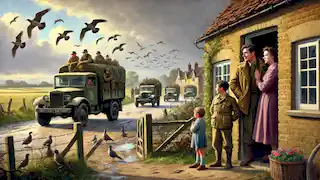The Birds
Reading time: 8 min
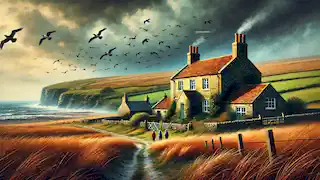
About this story: The Birds is a Realistic Fiction from United Kingdom set in the 20th Century This Dramatic tale explores themes of Nature and is suitable for Adults. It offers Moral insights. A chilling tale of survival as nature turns against mankind.
The east wind came down off the sea and smote the land, cold and sudden, biting into the flesh of the humans. It was a strange thing, that east wind; it didn’t belong to the temperate island off the western coast of Europe, where the prevailing breezes usually came from the west. But it was December, and the cold had a harshness, unlike anything experienced by Nat Hocken in his many years in Cornwall.
Nat was out in the fields when he first noticed it—the strange, unnatural behavior of the birds. He’d been working on the farm part-time ever since the war ended, his injury preventing him from resuming his former work as a craftsman. He was a thoughtful man, accustomed to observing nature. Today, however, something was off. As he walked through the frozen stubble of the fields, he saw the birds huddling together—silent, watchful, and unsettling.
He didn’t think much of it at first. But later, when he returned home to his wife and children, the wind had strengthened, howling like a creature from a nightmare. His wife, Jill, sat by the fire with their two young children, Johnny and Daisy, who had come in from school. Their tiny cottage stood isolated on the ridge of the hills overlooking the sea. Outside, the wind whistled down from the cliffs, rattling the windows.
"The wind's fierce today," Nat said as he shook off his coat and hung it by the door. "Feels like a storm's coming."
Jill looked up from her knitting. "It's that east wind. Strange, isn’t it?"
Nat nodded grimly, still thinking about the birds. He couldn’t put his finger on why it troubled him, but the memory stuck in his mind—those silent masses, sitting motionless in the fields, their dark eyes fixed on nothing.
They had supper in front of the fire, a warm comfort in the face of the chill outside. But as the evening wore on, the sense of unease only deepened. Just before they went to bed, they heard it—the sound of tapping against the window.
Nat rose and went to the window. There, outside in the dark, were birds—small ones, sparrows and finches, pecking furiously at the glass. Their wings flapped against the pane in a frenzy, and their beaks made sharp, staccato noises as they hit the window.
“Look at that,” Nat muttered. “They’ve gone mad.”
He tried to frighten them off by tapping back, but they persisted. Jill came up beside him, wrapping her arms around herself as though to ward off the cold.
“I don’t like this, Nat,” she said. “It’s not natural.”
They finally went to bed, but the unease clung to them, lingering in the corners of the house like a shadow.
*
By morning, things had worsened. Nat woke to find the sky black with birds. They circled in great flocks over the village, screeching and calling in a terrifying cacophony. The air seemed alive with their wings, and their cries filled every space, drowning out even the sound of the wind.
He went outside to get a better look and saw that they were everywhere—crows, gulls, starlings, and smaller birds too. They perched on rooftops, telephone wires, trees, and fences, filling every available space. And still, more came, pouring in from the sea.
"What the devil are they doing?" Nat whispered, half to himself. There was a strange intelligence in their behavior, as though they were planning something, waiting for the right moment to act.
That moment came soon enough.
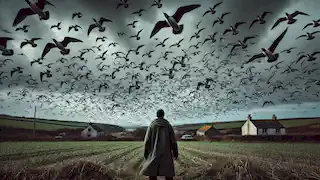
Around noon, the birds attacked. Without warning, they swooped down from the sky in great numbers, pecking at windows, doors, and any living creature they could find. Nat rushed inside to protect his family, but the birds were relentless. They hurled themselves against the windows with such force that the glass began to crack.
Jill screamed as a seagull smashed through the window, its wings flapping wildly as it flew around the room in a frenzy. Nat grabbed a shovel from the hearth and struck it, sending it crashing to the floor. But there were more outside, battering against the house with increasing violence.
“They’re trying to get in!” Jill cried, clutching Johnny and Daisy to her side.
Nat hurried to board up the windows, using whatever materials he could find—planks of wood, cushions, anything to stop the birds from breaking through. The children huddled in the corner, wide-eyed with fear, while Jill helped as best she could.
For the rest of the day and into the night, the birds kept up their attack. They threw themselves at the cottage in waves, never letting up, never tiring. Nat’s arms ached from boarding up the windows and doors, but he didn’t stop, knowing that their only chance of survival lay in keeping the birds out.
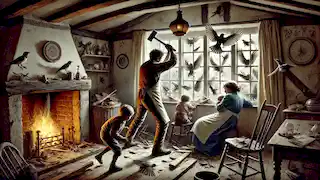
By the second day, the radio stations were reporting similar attacks all over the country. The birds were everywhere, attacking people, cars, even animals. The government was advising everyone to stay indoors, to block all possible entry points, and to wait for the situation to pass.
But no one knew why it was happening.
"Why are they doing this?" Jill asked, her voice trembling as they listened to the news reports. "What’s made them turn like this?"
Nat didn’t have an answer. All he knew was that something had changed. Nature had turned against them, and there was no telling when it would stop.
As the days passed, the attacks grew worse. The birds became more aggressive, more coordinated. They struck in the early hours of the morning, just before dawn, when the world was at its darkest. They seemed to know when people were most vulnerable, and they exploited it mercilessly.
Nat and his family survived by huddling in the smallest room of the house, away from the windows. They rationed their food, but supplies were running low, and there was no way of getting more. The birds had made it impossible to leave the house. Anyone who stepped outside was immediately set upon by a flurry of beaks and wings, their bodies torn apart in seconds.
One night, as they sat in the darkness, listening to the sound of birds pecking and scratching at the walls, Nat thought of the farm down the road. They had livestock there—chickens, cows, and sheep. If the birds had attacked the animals, then there might be some food left for them to scavenge. But getting there was another matter. The thought of stepping outside, even for a moment, filled him with dread.
“We’ll starve if we don’t do something,” Jill whispered, as though reading his thoughts.
Nat knew she was right. But the birds were everywhere. The only chance they had was to move quickly, to make a run for it before the birds could swarm them.
*
On the fifth day, the attacks began to slow. The birds didn’t come in the same overwhelming numbers, and there were long stretches of silence between the attacks. Nat used that time to make a plan. He would go to the farm at dawn, when the birds were at their quietest, and bring back whatever food he could find.
It was a dangerous plan, but they had no other choice. If they didn’t get food soon, they would starve.
The next morning, just before dawn, Nat crept out of the house. The air was cold and still, the sky faintly glowing with the first light of day. The birds were perched everywhere, watching silently as he moved across the yard.
He made it to the farm without incident. The animals were dead, their bodies torn and scattered across the yard. But there were still some supplies left—sacks of grain, a few tins of food. He gathered what he could and made his way back to the house.
Just as he reached the door, the birds attacked.
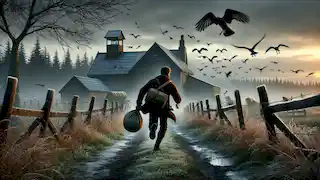
They came out of nowhere, swooping down from the rooftops and trees. Nat barely had time to react. He dropped the supplies and ran for the house, slamming the door behind him just as the birds crashed into it.
Inside, Jill and the children were waiting, terrified.
“They’re coming again!” she cried, her voice high with panic.
Nat didn’t answer. He was already boarding up the door, hammering nails into the wood as fast as he could. The birds were relentless, pecking and scratching at the door, their screeches filling the air.
For hours, they huddled in the dark, waiting for the attack to stop. Finally, just before dusk, the birds fell silent.
*
Over the next few days, the attacks gradually ceased. The birds no longer swarmed the house in the same numbers, and there were stretches of time when the air was still and quiet. Nat took this as a sign that the worst was over, though he knew better than to trust it completely.
But then, one evening, just as the sun was setting, they heard a new sound—distant, but unmistakable.
The sound of engines.
Someone was coming.
Nat rushed to the window and peered out. There, on the road below, was a convoy of trucks—army trucks, filled with soldiers.
The birds, it seemed, had finally been defeated.
